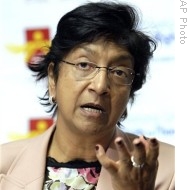-
(单词翻译:双击或拖选)
 |
| New UN High Commissioner for Human Rights, Navanethem Pillay, speaks during a press briefing about launch of 'Dignity and Justice for Detainees Week' in Geneva, 02 Oct 2008 |
The U.N.'s top human rights official, Navi Pillay, says arbitrary arrest and unlawful imprisonment is widespread and global. She says problems relating to detention exist in almost all countries.
But, while unlawful detentions7 have been going on for a long time, she says they have been made worse in recent years by the so-called war on terrorism.
"Many more individuals have been placed in detention as a result of these anti-terrorism initiatives by governments in many parts of the world," said Pillay. "So, the trend in new anti-terrorism legislation in some countries appears to allow the police to detain people for longer and longer periods prior to their being charged."
In the past, people normally were detained without charge for 48 hours. Now, they often are held incommunicado for months without charge, making them more vulnerable to torture.
Pillay says she attaches great importance to the rights of all detainees to have their cases reviewed by an independent and impartial8 tribunal. She says she is concerned that the human and legal rights of hundreds of suspected terrorists detained by the U.S. government in Guantanamo Bay are being trampled9.
But, the High Commissioner welcomes the recent decision by the U.S. Supreme10 Court confirming the constitutional right of habeas corpus for detainees in Guantanamo. Habeas Corpus places the burden of proof on those detaining the person to justify11 the detention.
While Guantanamo commands headline news, Pillay says it must not be forgotten that millions of people around the world suffer unjust imprisonment, or unjust treatment in prison.
"Every day around the world, there are hundreds of new cases of men, women and children being placed in detention, when they should not be - sometimes in quite inhumane conditions," she added.
The U.N. High Commissioner says people are detained for political reasons or because they are immigrants and asylum12 seekers. She says the poor, the disabled, orphans13, women who are trafficked and sexually abused are frequently imprisoned14.
She says the initiative her office is launching aims to shine the light on these forgotten victims of abuse and promote their cause for justice.
 收听单词发音
收听单词发音
1
commissioner

|
|
| n.(政府厅、局、处等部门)专员,长官,委员 | |
参考例句: |
|
|
|
2
detention

|
|
| n.滞留,停留;拘留,扣留;(教育)留下 | |
参考例句: |
|
|
|
3
plight

|
|
| n.困境,境况,誓约,艰难;vt.宣誓,保证,约定 | |
参考例句: |
|
|
|
4
imprisonment

|
|
| n.关押,监禁,坐牢 | |
参考例句: |
|
|
|
5
systematic

|
|
| adj.有系统的,有计划的,有方法的 | |
参考例句: |
|
|
|
6
violation

|
|
| n.违反(行为),违背(行为),侵犯 | |
参考例句: |
|
|
|
7
detentions

|
|
| 拘留( detention的名词复数 ); 扣押; 监禁; 放学后留校 | |
参考例句: |
|
|
|
8
impartial

|
|
| adj.(in,to)公正的,无偏见的 | |
参考例句: |
|
|
|
9
trampled

|
|
| 踩( trample的过去式和过去分词 ); 践踏; 无视; 侵犯 | |
参考例句: |
|
|
|
10
supreme

|
|
| adj.极度的,最重要的;至高的,最高的 | |
参考例句: |
|
|
|
11
justify

|
|
| vt.证明…正当(或有理),为…辩护 | |
参考例句: |
|
|
|
12
asylum

|
|
| n.避难所,庇护所,避难 | |
参考例句: |
|
|
|
13
orphans

|
|
| 孤儿( orphan的名词复数 ) | |
参考例句: |
|
|
|
14
imprisoned

|
|
| 下狱,监禁( imprison的过去式和过去分词 ) | |
参考例句: |
|
|
|















